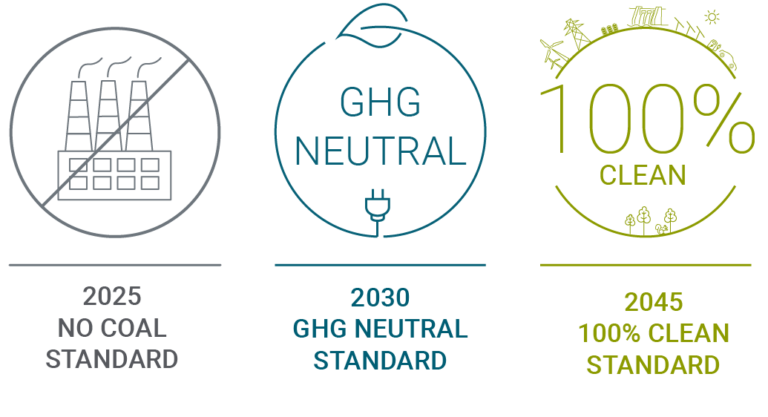CETA Overview and Interim Assessment
CETA applies to all electric utilities serving retail customers in Washington and sets specific milestones to reach a 100% clean electricity supply. The law requires utilities to phase out coal-fired electricity from their state portfolios by 2025. By 2030, their portfolios must be greenhouse gas emissions neutral, which means they may use limited amounts of electricity generated from natural gas if it is offset by other actions. By 2045, utilities must supply Washington customers with electricity that is 100% renewable or non-emitting with no provision for offsets.

Utilities may adopt a slower transition path if necessary to avoid rate shock. The law also provides for short-term waivers of the clean energy standards if needed to protect reliability.
CETA requires that equity considerations become an explicit part of utility planning. Utilities must assess the potential impacts of their decisions on two communities: vulnerable populations and highly impacted communities. Vulnerable populations are communities that experience a disproportionate cumulative risk from environmental burdens due to socioeconomic and biological factors that are identified by utilities in conjunction with public input. Highly impacted communities are geographic communities, impacted by fossil fuels and climate change and identified by the Washington State Department of Health’s Environmental Health Disparities Map.
Utilities must provide a public process for receiving feedback on their plans and a description of how public comments were reflected in their governing board or commission-approved plans. Utilities must also improve energy assistance programs for low-income households by designing programs that lower energy burden.
CETA supports Washington workers and businesses by providing tax incentives for clean energy projects that employ women, minority, or veteran-owned businesses, businesses that have a long history of complying with federal and state wage and hour laws and regulations, and employers who hire local workers or offer apprenticeship programs. The incentives are available through 2029 to encourage early investments in the electric grid.
Commerce is working closely with the Utilities and Transportation Commission (UTC), which regulates the rates and service of investor-owned utilities, to implement CETA. Other state agencies with roles in CETA implementation and compliance include the State Auditor, the Attorney, and the departments of Ecology and Health. Interested stakeholders include business customers, low-income and vulnerable communities, consumers, environmental advocates and renewable energy developers.
CETA Interim Assessment
The Washington Legislature requires Commerce to conduct an interim assessment of the impact of CETA’s impacts under RCW 19.405.080. The assessment was submitted ahead of the January 1, 2024, and is posted below.
- CETA Interim Assessment (link)
Public workshop
Monday, Oct. 9 at 1 pm
Commerce will be holding a public workshop on Oct. 9 at 1 pm on its interim assessment of the Clean Energy Transformation Act (CETA). The workshop will be held at the Smart Buildings Center in Seattle and will have a virtual attendance option. Meeting details and materials are posted on the CETA Overview and Interim Assessment webpage.
The workshop follows a public comment period and request for published studies, reports on what stakeholders deem relevant for consideration for an assessment on CETA’s impact-to-date. Additional meeting details and materials will be posted ahead of the workshop.
Meeting materials
- Agenda (link)
- Presentation (link)
- Public comments (link)
- Recording (link)
CETA Links
Law and Regulations
Consumer-Owned Utilities
Investor-owned Utilities
Additional Resources
Contact
Glenn Blackmon, Ph.D.
Manager, Energy Policy Office
Email: CETA@Commerce.wa.gov
Phone: 360-339-5619
Austin Scharff
Energy Policy Specialist
Email: CETA@Commerce.wa.gov
Phone: 360-764-9632
